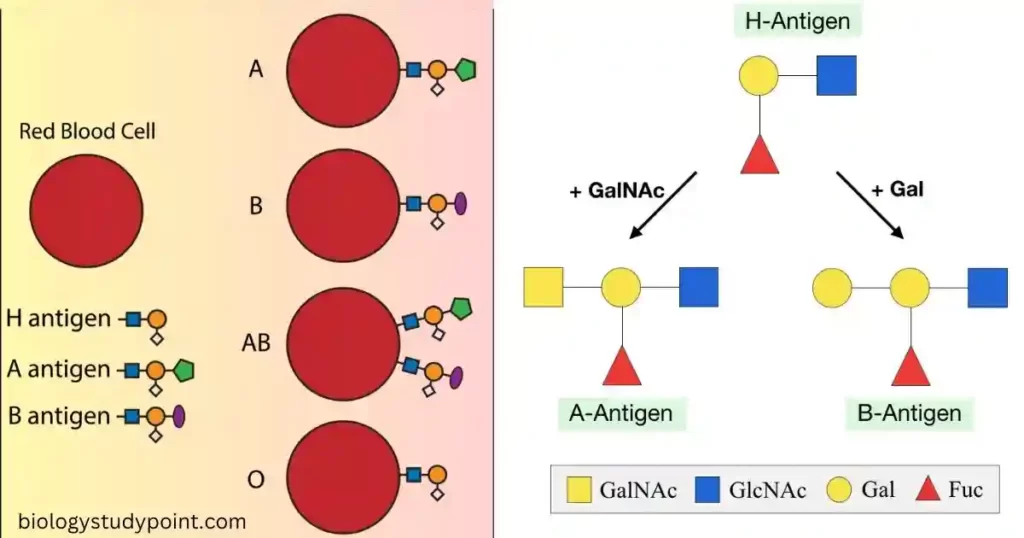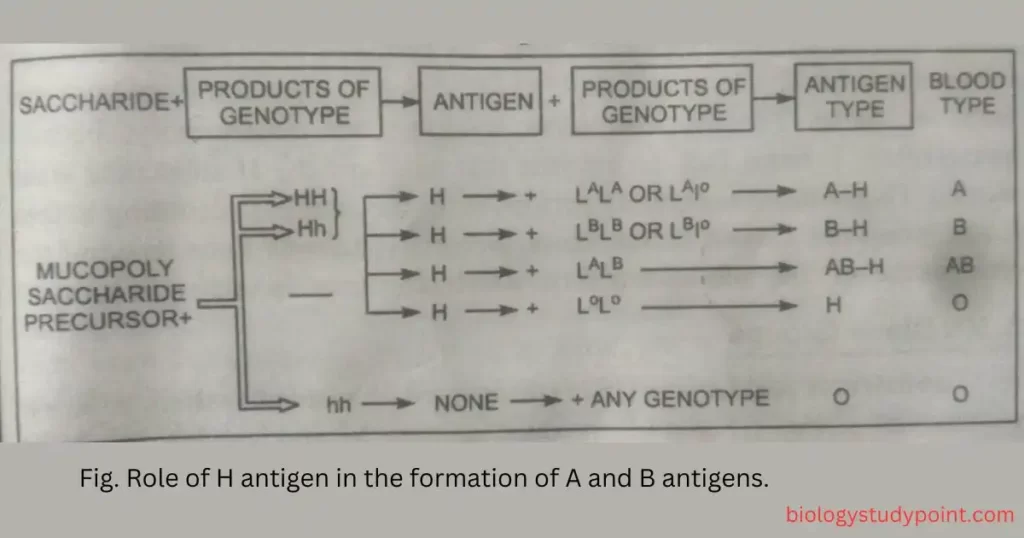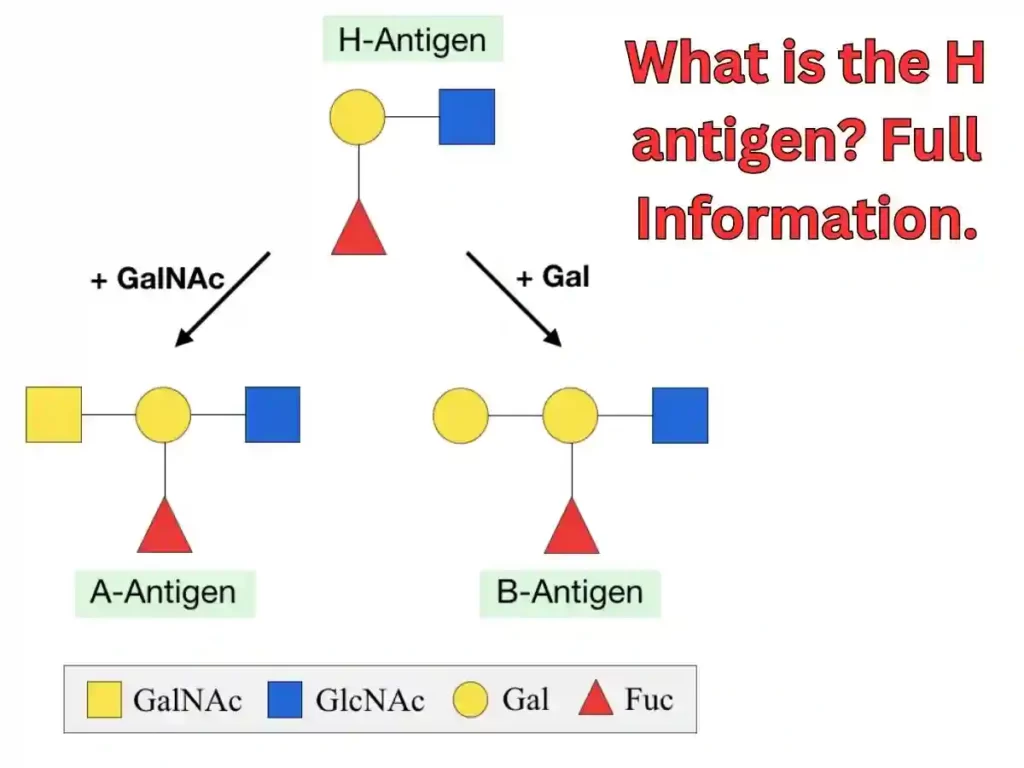Hello, guys. In today’s article, we will study H Antigen. What is the H antigen? What is the Bombay phenotype? We will know the answers to many such questions today, so let’s start.
What is the H antigen, and what is the Bombay phenotype?
In the ABO blood group system, antigen A and antigen B are polymucosaccharides. Their carbohydrate chain is bound to the lipid molecule on the surface of the plasma membrane of RBCs. The terminal monosaccharide molecule of these carbohydrate chains differs in antigens A and B.

In is N-acetyle-α-D-galactosamine in antigen A and α-D-galactosamine in antigen B. The allele LA directs the synthesis of enzyme N-acetyl galactosaminyl transferase, which controls the addition of modified N-acetyl-α-D galactosamine to the carbohydrate chain. Allele LB controls the synthesis of the enzyme galactosyl transferase, which determines the addition of α-D-galactosamine.
Both antigens A and B are synthesized from a precursor called H-substance. This substance lacks both the terminal monosaccharides found in antigens A and B. Another pair of alleles., HH or Hh converts the precursor into antigen H.
- Blood group A persons have genotyped LA – H – (i.e., LA LA HH or LA LA Hh or LA lo HH or LA lo Hh)
- Blood group B persons have genotype LB – H —.
- Blood group AB persons have genotyped L LBH–.

Blood group O persons are found to have the following different genotypes.
- hh – – (i.e. hhLALA, hhLBLB, hhLALB, hhLAlo or hhLBlo or hhlolo)
- HhloloPersons with hh are unable to convert mucopolysaccharide precursor into antigen H because of the absence of gene H, which is necessary for the synthesis of antigen A and antigen B. Persons with gene LA or gene LB fail to produce the specific antigen and exhibit O phenotype, i.e., a person with LALA hh or LBLB hh or LA LB hh genotypes also have blood group O.
- Persons with HHlolo can convert precursor into antigen H. Therefore, their RBCs have antigen H on the surface. But because of the lolo genotype, antigen H is not converted to other antigens, and persons have blood group O.
The hh condition was first reported in 1952 from Bombay in a woman. Therefore, this is called the Bombay phenotype. Its frequency is estimated to be 1 in 13,000 in Bombay. Persons with Bombay phenotype lack the A and B antigens and are typed as O.
Because of recessive mutation h, antigen H is not synthesized. The terminal portion of the carbohydrate chain protruding from the membrane of RBCs lacks the monosaccharide α-L-fucose. Without fucose, the enzymes specified by LA or LB allele fail to add terminal α-D-galactose or N-acetyl-α-D-galactosamine and synthesize antigen A or B.
Secretory Trait
The antigens A, B, AB, and H on the surface of RBCs are also found in the various body secretions, such as the eyes, nose, and salivary glands. This is called secretory trait. A single pair of genes, Se and Se, controls it.
The dominant gene, Se, controls the secretion of these antigens in the body fluids. About 77 to 78% of persons have dominant genotype Se/Se or Se/se. Persons with se/se genotype are nonsecretory, because nonsecretory persons lack an enzyme that modifies the H substance water-soluble.
Therefore, nonsecretory persons make the antigens according to their blood group but can not secrete them. Secretory persons have an enzyme that changes the antigens into a soluble form, which is secreted in body secretions.
MN Blood Groups –
Landsteiner and Levine (1927) discovered the MN blood system. A pair of codominant alleles, LM and LN, produce antigen M and antigen N. These alleles produce three blood groups: M, N, and MN. The persons in these blood groups have respective antigens but do not have natural antibodies against these antigens.
Therefore, the MN blood system is not Important in blood transfusion. However, each native antigen, M or N, produces an antibody response when injected into rabbits.
S/s Antigens
In 1947, another pair of antigens S/s were found to be associated with the M and N series. The genes for S and s antigens MS and NS are not allelic of the MN genes. Race and Sanger (1968) have described these genes as codominant, closely linked, and interrelated with MN genes. The different gene combinations of MN and Ss series can be – MS, Ms, NS, Ns, MNSS, MNSs, or MNss.
Conclusion
So, friends, we studied the h antigen in today’s article. Friends, if you like this article, please comment and explain to us your suggestions and our mistakes.
Thanks
